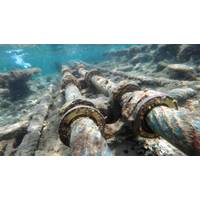Australia Blocked Grid Sale over South China Sea worries
Australia halted A$10 bln grid sale to State Grid Corp of China.
Australia blocked the sale of a major power grid company to Chinese interests in part over concerns that China, its biggest trading partner, is becoming a geo-political threat, a senior member of Australia's government said.
Treasurer Scott Morrison, from the country's pro-business centre-right coalition, halted the A$10 billion ($7.7 billion) sale of Ausgrid to government-owned State Grid Corp of China and Hong Kong's Cheung Kong Infrastructure Holdings on Thursday, citing national security issues.
"The South China Sea disputes, the increased recognition that the Chinese regime is more authoritarian than we originally thought and the fact we are dealing with a state-owned enterprise; those three things have suspended people's free-market instincts," a senior member of Australia's ruling Coalition told Reuters.
While China's growing militarisation of the South China Sea has been a source of rising diplomatic and military tension with neighbours and the United States, the Australian decision indicates that trade matters could also be caught up in developments.
Last month, an arbitration court in The Hague ruled China did not have historic rights to the South China Sea, where it has built airstrips and other structures on disputed islands and artifically reclaimed land. China has rejected the court's ruling.
The Ausgrid intervention came shortly after an eleventh-hour move by British Prime Minister Theresa May to delay a final decision on building a nuclear plant part funded by China.
Some fear blocking the Ausgrid deal will damage relations with a vital trading partner and disrupt the sale of other state-owned assets and private deals involving foreign bidders.
The China state-owned news agency Xinhua said on Friday that the decision was a "another demonstration of (Australia's) obscure and inconstant strategy towards Chinese investors".
"If Australia keeps sending mixed signals to Chinese bidders, it would eventually cast the impression as an unpredictable investment environment to Chinese buyers as well as other potential investors."
Australia also recently rejected a bid for the country's largest agricultural landowner, S. Kidman & Co, led by China's Hunan Dakang Pasture Farming Co Ltd.
Morrison's intervention over Ausgrid, which operates New South Wales state power networks - major foreign investment deals require his approval - also casts a cloud over several impending sales, as the country's second-largest state, Victoria, and resources-rich Western Australia also have large infrastructure assets to sell.
"We've been watching Ausgrid pretty closely and, like many people, we would love to know what national interest means," said one person involved in selling another major asset, who asked not to be named.
Morrison rejected suggestions on Friday his decision was aimed at Beijing. He said it was "not a country-specific decision". He did not detail exactly what the national security issues were.
CLIMATE CHANGE
Since the former Australian treasurer, Joe Hockey, waved through State Grid Corp of China's purchase of a 60 percent stake in energy infrastructure company Jemena in 2013, the Australian political climate has shifted.
A 2015 lease of the Port of Darwin to Chinese interests said to be close to the People's Liberation Army sparked an outcry about the country's foreign purchase approvals process, including from U.S. lawmakers concerned about security implications.
General elections in July this year gave control of the Australian Senate to an assortment of protectionist independents, forcing the same governing party that once welcomed State Grid Corp of China to suggest it was a security risk.
"The danger for us is to pretend that there's some sort of invisible separation barrier between how China behaves militarily in the region on the one hand and how it directs investment on the other," said Peter Jennings, executive director of think-tank Australian Strategic Policy Institute and a former defence department official.
State Grid, China's dominant power distributor, did not immediately respond to requests seeking comment after the Ausgrid decision. Cheung Kong Infrastructure (CKI), controlled by Hong Kong billionaire tycoon Li Ka-Shing, said the decision was not related to CKI.
The increased tension between Australia and China comes just eight months after a A$100 billion free-trade agreement took effect between the trade partners.
Former Australian Senator Sean Edwards told Reuters that many members of the ruling Coalition felt uncomfortable with the sale of critical infrastructure to foreign state-owned enterprises.
"I think what happened at Darwin Port was ill conceived, and the result of that was something that was poorly managed in terms of due diligence," he said.
"Ultimately the federal government couldn't touch that or overturn it because it didn't have jurisdiction. But in this case, with Ausgrid, I fully support the Treasurer's decision."
By Byron Kaye, Jonathan Barrett and Matt Siegel





